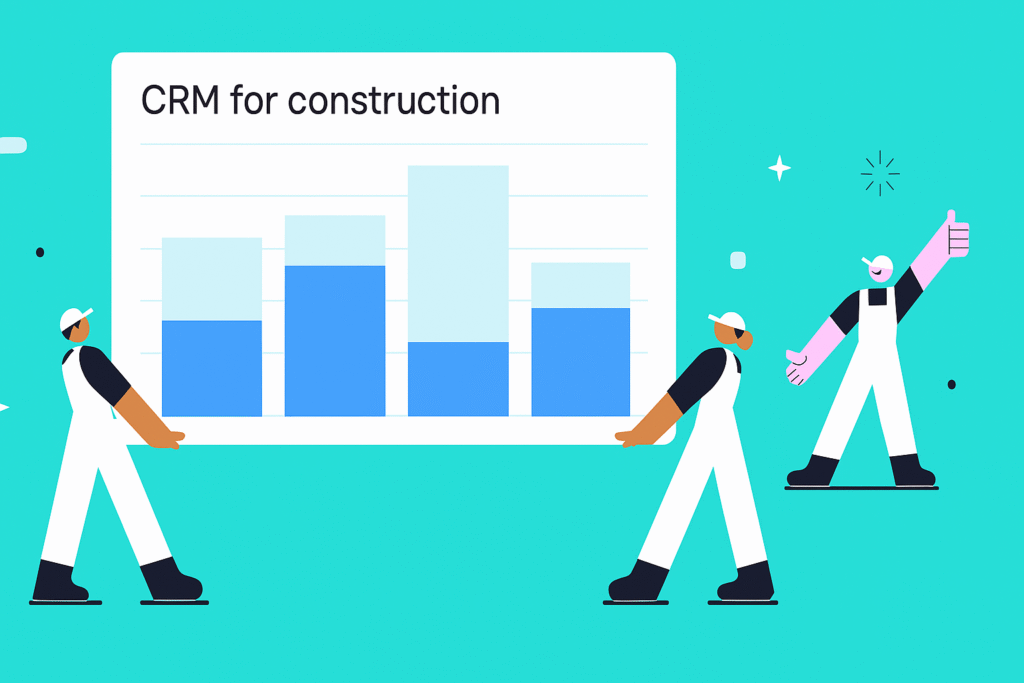In today’s competitive construction landscape, communication and coordination are everything. From tracking bids to managing clients and subcontractors, the right CRM for construction can be the difference between winning projects — or losing them to disorganization.
Unlike generic CRMs, platforms built for the construction industry streamline how contractors, estimators, and project managers track leads, manage relationships, and connect sales to operations. In this guide, you’ll learn what a construction CRM does, how it helps your business, what features to look for, and a snapshot of the best options available in 2025.
What Is a CRM for Construction?
A CRM for the construction industry (Customer Relationship Management) is a software system that organizes customer data, project details, and communication into a single, accessible hub. It’s designed specifically for contractors, builders, and construction firms that manage complex relationships with multiple stakeholders — from clients and architects to subcontractors and suppliers.
Instead of scattered spreadsheets or endless email threads, a CRM centralizes every touchpoint: lead tracking, estimates, contracts, timelines, and service history. The result? Clearer visibility, better follow-ups, and stronger client trust.
Why a CRM Matters in the Construction Industry
Construction is unique — every project is a mix of technical details, client expectations, and constant change. A CRM built for this reality delivers benefits that go far beyond traditional sales tracking.
1. Centralized Client & Project Data
No more digging through inboxes or file folders. A CRM stores all client interactions, bid notes, and project details in one organized place.
2. Faster, Smarter Bidding
CRMs help you manage bid deadlines, track proposal status, and set automated reminders for follow-ups — so opportunities don’t fall through the cracks.
3. Seamless Collaboration
From office to field, everyone works off the same data. Estimators, PMs, and CSRs can update job notes, share documents, and communicate through one platform.
4. Better Client Experience
CRM automation ensures consistent updates and responses, improving client satisfaction and repeat business.
5. Scalable Growth
As your business expands, your CRM scales with you — adding users, projects, and integrations without the chaos of disconnected tools.
10 Must-Have Features in a CRM for Construction
When evaluating CRM software, prioritize tools that solve industry-specific challenges rather than generic sales tasks. Here’s what to look for:
- Project & Pipeline Management – Track leads, bids, and ongoing projects with customizable stages.
- Lead Capture & Nurturing – Collect inquiries from your website or referrals, and automate follow-up emails or calls.
- Document Storage – Keep contracts, blueprints, and specs attached to each client record.
- Workflow Automation – Automate reminders for bids, invoices, or change orders.
- Subcontractor Management – Store contact info, certifications, and project history.
- Estimating & Quoting Tools – Build proposals and send quotes directly from the CRM.
- Communication Tracking – Sync email and call logs to avoid missing client updates.
- Analytics & Reporting – Track performance metrics like win rate, sales cycle time, and revenue by project type.
- Mobile Access – Allow your team to view and update information directly from the field.

Best CRM Platforms for the Construction Industry (2025 Overview)
Here’s a quick look at the leading CRM software for construction companies in 2025, including what makes each one stand out.
1. Monday CRM
Best for: Contractors who need flexibility and customization.
Monday CRM offers a visual, no-code interface that lets construction companies create their own workflows. You can customize pipelines, automate follow-ups, and view dashboards showing bids, client communications, and project timelines. Its integration with Slack, Google Workspace, and QuickBooks makes it ideal for fast-growing teams.
Pricing: From $12/user/month
2. Procore
Best for: Mid-to-large construction companies needing full lifecycle management.
Procore is more than a CRM — it’s a project management powerhouse. It integrates client data, bids, project schedules, and subcontractor management into one platform. It’s ideal for firms that want seamless alignment between pre-construction and field operations.
Pricing: Custom quote based on company size and scope.
3. HubSpot CRM
Best for: Small-to-medium firms wanting scalability.
HubSpot CRM provides a clean, easy-to-use platform with automation and analytics. While not built specifically for construction, it integrates well with estimating tools and marketing systems, helping contractors manage relationships from first contact to project completion.
Pricing: Free plan available; paid plans start at $15/user/month.
4. JobNimbus
Best for: Roofing and specialty contractors.
JobNimbus combines CRM and project management tools in one interface. Users can track leads, manage job photos, automate follow-ups, and generate estimates — all from desktop or mobile. It’s especially strong for roofing, remodeling, and exterior trades.
Pricing: Custom pricing upon request.
5. Zoho CRM
Best for: Contractors seeking affordability and robust automation.
Zoho CRM supports lead tracking, pipeline automation, and communication management. With its customizable modules and mobile app, it’s ideal for small firms that want CRM power without enterprise complexity.
Pricing: Free plan available; paid plans from $14/user/month.
6. Buildertrend
Best for: Builders and remodelers who want CRM + project tracking.
Buildertrend is an all-in-one tool for construction companies that need more than contact management. It combines CRM, scheduling, budgeting, and document sharing — keeping teams and clients aligned throughout each project.
Pricing: Plans start at $499/month.
7. Pipedrive
Best for: Contractors managing complex sales pipelines.
Pipedrive uses a visual drag-and-drop pipeline to manage leads and deals efficiently. Its automation features help with follow-ups and reminders, making it ideal for general contractors juggling multiple bids.
Pricing: Starts at $14/user/month.
8. Jobber
Best for: Field service and small construction teams.
Jobber helps construction and remodeling businesses manage client communication, estimates, and on-site updates. Its mobile app ensures teams can access schedules and job details from anywhere.
Pricing: Starts at $19/user/month.
| Software | Best For | Standout Feature | Pricing |
|---|---|---|---|
| Monday CRM | Construction companies that need a flexible, customizable, and intuitive platform | Customization and flexibility | Premium plans from $12/user/month |
| Pipedrive | Small to medium-sized construction companies or contractors looking for a visual Kanban-style pipeline | Visual sales pipeline management | Premium plans from $14/user/month |
| HubSpot CRM | Small to medium-sized construction businesses looking for a scalable solution | Sales and marketing automation | Free plan available; premium plans from $15/user/month |
| Procore | Construction companies of all sizes managing complex projects | CRM and project management integration | Custom pricing on request |
| Zoho CRM | Small to medium-sized construction companies looking for a scalable solution | Lead management | Free plan available; premium plans from $14/user/month |
| Jobber | Construction and remodeling businesses with teams working on-site | Comprehensive client management | Premium plans from $19/user/month |
| Capsule CRM | Small to mid-sized construction firms that need a customizable, mobile-friendly CRM solution | Robust mobile app | Free plan available; premium plans from $18/user/month |
How to Choose the Right CRM for Your Construction Business
With so many CRM options available, the best one for your company depends on your size, workflow, and goals. Here’s a simple framework:
- Define your priorities: Do you need better client tracking, project visibility, or communication tools?
- Consider integrations: If you already use Procore, QuickBooks, or Buildertrend, choose a CRM that syncs seamlessly.
- Start small: Begin with essential features like contact management and automated follow-ups.
- Test usability: Involve your estimators, project managers, and admins in trials to ensure adoption.
- Track ROI: Measure improvements in response time, client satisfaction, and bid win rate after implementation.
Final Thoughts
The construction business moves fast — and information moves even faster. Implementing a CRM for construction helps you stay organized, communicate clearly, and convert more opportunities into projects.
Whether you’re a small contractor or a large general builder, the right CRM will streamline your workflows, strengthen client relationships, and keep your operations aligned from bid to build.
Ready to bring structure to your construction workflow?
Partner with OfficeTwo to build your remote CRM, admin, or estimating team — so you can focus on the field while we handle the follow-up.
FAQs About CRM for Construction
What is the best CRM for construction companies?
The best CRM for construction companies depends on your business size, workflow, and priorities. For customizable flexibility, monday CRM is a standout choice—it lets contractors build tailored pipelines, automate follow-ups, and integrate with accounting or scheduling tools. Procore is ideal for larger firms that want CRM features built into their project management environment, while JobNimbus is a top pick for roofing and remodeling businesses that need mobile job tracking and client management in one. If you’re a smaller contractor, Zoho CRM and HubSpot CRM offer affordable plans with simple automation and reporting tools.
Why should construction companies use a CRM?
A CRM for the construction industry does far more than store client contacts—it transforms how you manage the entire customer lifecycle. With a construction CRM, you can:
- Track bids, leads, and project opportunities in one dashboard.
- Store contracts, blueprints, and emails for quick access.
- Automate follow-ups to prevent missed deadlines.
- Improve communication between office and field teams.
Ultimately, a CRM helps construction companies stay organized, close more deals, and deliver a better client experience—all while improving profit margins and reducing admin work.
Can a CRM replace project management software?
Not exactly. While a CRM for construction handles sales, bids, and customer communication, project management software focuses on what happens after the job is won—like scheduling, budgeting, and field coordination. However, the two systems complement each other perfectly. Many modern CRMs, such as Procore and Buildertrend, integrate CRM and project management into a single platform, ensuring a smooth handoff from sales to operations.
Is a CRM worth it for small contractors or independent builders?
Yes—especially for small teams juggling multiple jobs at once. A CRM helps solo contractors or small firms organize client data, track quotes, and manage communication without relying on messy spreadsheets or sticky notes. By automating reminders and centralizing information, small businesses can look and operate like much larger companies. Even free or low-cost CRMs like HubSpot, Zoho, or Pipedrive offer scalable options to help small contractors stay competitive, save time, and never lose track of a potential lead.


